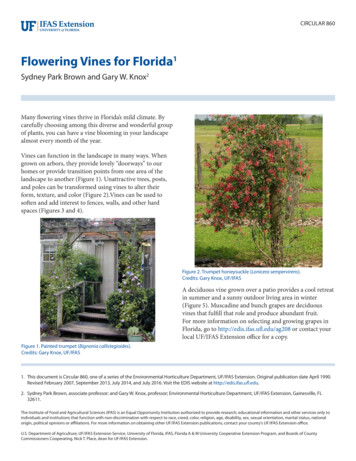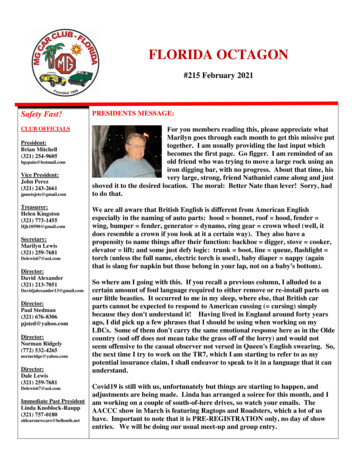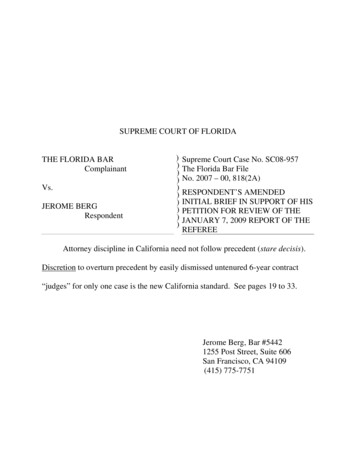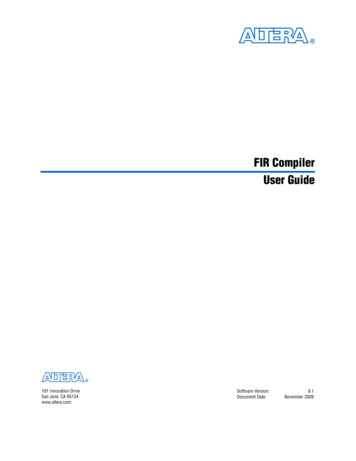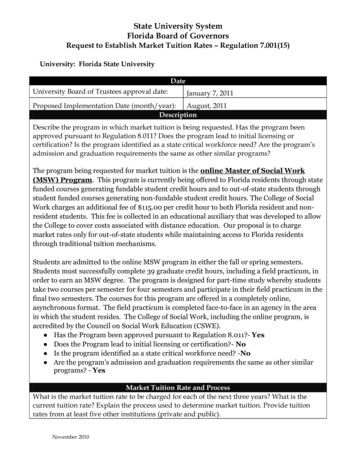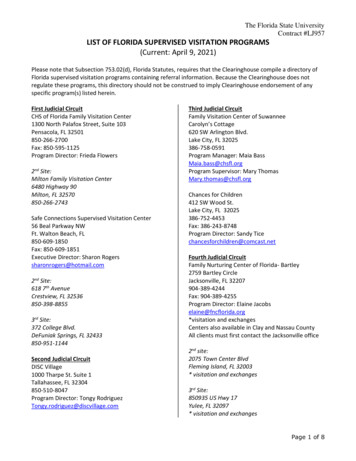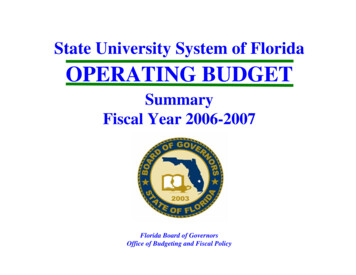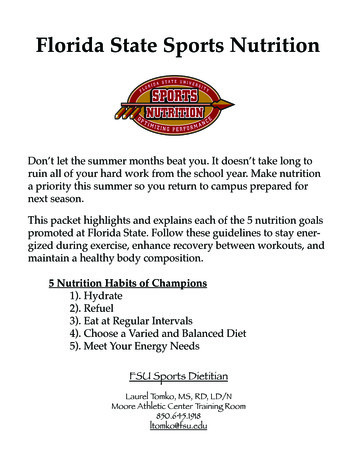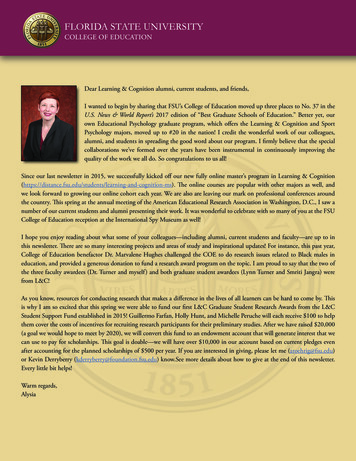
Transcription
FLORIDA STATE UNIVERSITYCOLLEGE OF EDUCATIONDear Learning & Cognition alumni, current students, and friends,I wanted to begin by sharing that FSU’s College of Education moved up three places to No. 37 in theU.S. News & World Report’s 2017 edition of “Best Graduate Schools of Education.” Better yet, ourown Educational Psychology graduate program, which offers the Learning & Cognition and SportPsychology majors, moved up to #20 in the nation! I credit the wonderful work of our colleagues,alumni, and students in spreading the good word about our program. I firmly believe that the specialcollaborations we’ve formed over the years have been instrumental in continuously improving thequality of the work we all do. So congratulations to us all!Since our last newsletter in 2015, we successfully kicked off our new fully online master’s program in Learning & ng-and-cognition-ms). The online courses are popular with other majors as well, andwe look forward to growing our online cohort each year. We are also are leaving our mark on professional conferences aroundthe country. This spring at the annual meeting of the American Educational Research Association in Washington, D.C., I saw anumber of our current students and alumni presenting their work. It was wonderful to celebrate with so many of you at the FSUCollege of Education reception at the International Spy Museum as well!I hope you enjoy reading about what some of your colleagues—including alumni, current students and faculty—are up to inthis newsletter. There are so many interesting projects and areas of study and inspirational updates! For instance, this past year,College of Education benefactor Dr. Marvalene Hughes challenged the COE to do research issues related to Black males ineducation, and provided a generous donation to fund a research award program on the topic. I am proud to say that the two ofthe three faculty awardees (Dr. Turner and myself ) and both graduate student awardees (Lynn Turner and Smriti Jangra) werefrom L&C!As you know, resources for conducting research that makes a difference in the lives of all learners can be hard to come by. Thisis why I am so excited that this spring we were able to fund our first L&C Graduate Student Research Awards from the L&CStudent Support Fund established in 2015! Guillermo Farfan, Holly Hunt, and Michelle Peruche will each receive 100 to helpthem cover the costs of incentives for recruiting research participants for their preliminary studies. After we have raised 20,000(a goal we would hope to meet by 2020), we will convert this fund to an endowment account that will generate interest that wecan use to pay for scholarships. This goal is doable—we will have over 10,000 in our account based on current pledges evenafter accounting for the planned scholarships of 500 per year. If you are interested in giving, please let me (aroehrig@fsu.edu)or Kevin Derryberry (kderryberry@foundation.fsu.edu) know.See more details about how to give at the end of this newsletter.Every little bit helps!Warm regards,Alysia
FLORIDA STATE UNIVERSITYCOLLEGE OF EDUCATIONFACULTY UPDATESSusan Carol Losh, Ph.D.Associate ProfessorI am editor-in-chief of Bulletin on Science, Technology & Society, which will shortly post two brand-new science fiction andsociety issues (http://bst.sagepub.com). I also recently collaborated with James Powell (geologist at USC) on a BSTS article onperceived and actual agreement among scientists on climate change. SiSi Dong and I are writing a presentation for AERA onfamily structure and kindergarten readiness (from her thesis). I am also working to submit a presentation on research experiencesand self-perceived collegiate benefits among STEM undergraduates. I completed my second year of teaching Theories of SocialPsychology online for our new online master’s program, and I am currently in the process of putting Group Processes online aswell.Beth Phillips, Ph.D.Associate ProfessorI have continued my work on early childhood projects, including a grant from the Spencer Foundation in which I am investigatingthe language environment of preschool classrooms serving high-need three and four year old children. I also, with colleagues,just received a new intervention grant award from the Institute of Education Sciences to investigate the benefits of receiving oneversus two years of early intervention in language and vocabulary skills. I am also hard at work preparing a new seminar for fall2016 that will focus on critical thinking and on high quality professional writingAlysia Roehrig, Ph.D.Associate Professor, Educational Psychology Graduate Program CoordinatorMy research is related to effective teaching in general, with primary foci on the professional development of teachers and theliteracy learning of students. Following my sabbatical in two elementary schools in nearby Gadsden County, I got involved indoing research at a Children’s Defense Fund Freedom Schools site in Quincy, FL. Freedom Schools are 6-week summer campsthat provide a wonderful, free opportunity for intergenerational mentoring and culturally relevant literacy instruction with thegoal of showing children how they can make a difference in the world. Along with other colleagues and COE alumni fromboth FSU and FAMU, we decided to start our own nonprofit called North Florida Freedom Schools in order to bring the firstFreedom Schools camp to Tallahassee this summer and to eventually develop more sites across North Florida. Freedom Schoolsalso provide a wonderful partnership opportunity for colleagues to research topics related to social justice and engaging teaching.We are excited about the numerous opportunities for collaboration going forward. If you are interested in learning more orsupporting this effort, please check out NFFS.wordpress.com. I conclude with a shout out to my three most recent Ph.D.graduates, who all started their first faculty positions in fall 2015: so proud of you Meagan Arrastia, Beth Brinkerhoff, and TimPressley!Jeannine Turner, Ph.D.Associate ProfessorMy research continues to focus on issues related to students’ motivation, emotions, and learning. Along these lines, this pastyear several of my students and I have continued our investigations into engineering students who are in our FAMU-FSU jointengineering programs. In particular, we are trying to understand the reasons why our FAMU African American male studentsdrop out of the program at alarmingly high rates. Two master’s students (Connie Barroso and Jinjushang Chen) have been lookingat students’ epistemological beliefs and we should know their findings this summer. Michelle Peruche will be collecting data onsuccessful seniors this summer. As part of my Marvalene Hughes grant, both Michelle and Andria Cole will be conductinginterviews with junior-level FAMU students this summer. In the near future, we anticipate providing the engineering programswith information that can help retain all students, but particularly our African American males. In a similar, but different vein ofresearch, Holly Hunt will be interviewing FSU student veterans to better understand their thinking processes regarding findingan academic major and trying to determine how their past experiences affect their current decision-making and approaches tostudying. (continued.)
FLORIDA STATE UNIVERSITYCOLLEGE OF EDUCATION(continued)My second research focus concerns students’ motivation, emotions, and learning of foreign or second language skills—i.e., speaking, reading, listening, and writing. Several of my students and I are focused on different aspects of this issue. FeiXing recently spent time in China observing and interviewing both teachers and students in an English program that purportsto focus on integrating communicative strategies. She learned a great deal about what these strategies look like and how theimplementation affects both teachers and students. Yanyan Chan will be interviewing students in China very soon about theirreasons and cognitive processes regarding choosing English as an undergraduate major. Stephan Cooley will be surveyinginternational students within centers for intensive English programs to see if their motivation variables interact in ways thathave been shown with ordinary foreign language students. Next semester, Darcey (Fang Liang) will be interviewing internationalgraduate students about their writing anxiety and ways they cope with their anxiety, while Maipeng Wei will be investigatingEnglish students’ efficacy and motivation for learning uncommon foreign languages (such as Arabic or Japanese). Finally, myresearch group is developing a study that is focused on Chinese students’ motivation and efficacy for learning all skills of Englishand how they use multiple media to facilitate their learning.Across these different learning endeavors, self-regulation of learning, motivation, and emotions is at the core of success.Shawna Durtschi is conducting an interesting study with school librarians to understand how they believe they promote andregulate students’ motivation for reading. Shawna, Michelle, Holly, Courtney Barry (a recent graduate), and I are working onturning our previous research with Hispanic FSU-CARE students into a publication and Kelly Torres, Stephan, Yanyan, YanyuPan, and I are working on turning our previous research with Chinese Heritage Language learners into a publication manuscript.As you can see, we have a lot of cool investigations going on!
FLORIDA STATE UNIVERSITYCOLLEGE OF EDUCATIONSTUDENT PROFILESConnie BarrosoMy name is Connie Barroso and I am a master’s student in the Learning & Cognition program. Myresearch interests include examining cognitive and motivational factors that influence students of allraces, gender, and ages to be interested and pursue a career in science, technology, engineering, andmathematics fields. I am currently working on collecting my thesis data. My thesis focuses on twomain topics: students in engineering programs, and their intelligence mindset, or student’s beliefsabout the malleability of their intelligence. There is an abundance of research on the implicationsof intelligence beliefs on educational outcomes (i.e., fixed versus growth mindset); however, there isnot much research investigating factors that can change these beliefs, particularly on how academicfeedback relates longitudinally to student’s intelligence mindset. Using upper-level engineeringcourses, I am investigating changes in engineering students’ intelligence mindset over the course ofa semester as related to exam performance. In my spare time, I like to play ultimate frisbee and hangout with my dog, Lola.Fang YangMy name is Fang Yang and I am currently a 3rd year master’s student in our program. Given myprevious work experience in a scientific institution in China, I am particularly interested in areasof study that are related to science education and science literacy. In a similar vein, I am concernedabout the notable underrepresentation of women in STEM fields and I hold positive expectationsthat the gap can be bridged through science education. In the meantime, as an international studentfrom China, I am also interested in studies relevant to international students, e.g., acculturation,stress coping strategies, etc. While enjoying my graduate life here at FSU, I am keenly aware of theshortage of background knowledge of American education in general and try to make it up by takingcourses and interacting with local students. Currently, I am taking a history class on Americanhigher education in the hope that I can get better informed of the higher education system in theU.S. through a historical lens.Julieth DiazMy name is Julieth Diaz, and I am finishing my first year as a master’s student in the Learning &Cognition program. I am really interested in researching different variables involved in the settingof positive educational environments, particularly within highly vulnerable contexts, such as thosecharacterized by poverty, violence, and inequality. I think the value of research is on its application;every finding needs to be analyzed through the lens of the surrounding reality. This is the onlyway social scientists can become actual activists, contributing from academia to the generation ofmeaningful changes in the status quo. In places like Latin America (where I come from), schools needto turn into places that elicit and cultivate individuals’ critical thinking about their own reality, givingthem proper tools to construct new individual and collective paradigms.
FLORIDA STATE UNIVERSITYCOLLEGE OF EDUCATIONLaura M. JakielHi, my name is Laura M. Jakiel and I am a second year doctoral student in Learning & Cognition. Ireceived my B.S. in Psychology from The University of Florida in 2009, and received my M.S. degreein Educational Psychology from our own program in 2014. Along the way, I completed certificatesin Measurement & Statistics as well as Institutional Research, and recently enrolled in a second M.S.degree in Information Technology.I presently teach Classroom Assessment and work part time as the Education Projects Assistant forthe Association for Institutional Research. I build and manage the curriculum and testing for theironline courses. I am also working on my preliminary study, researching a revised factor structure ofthe Future Time Perspective Scale as well as the validity of the measure. My doctoral research willbe in the creation of educational technology that combines motivation, persuasive design, time management, reading, and notetaking into an online application (hence my pursuit of the MSIT degree). I hope to work on that research for years to come andhopefully integrate it into mainstream education. Wish me luck!Mengmeng YinThis is my first semester; I transferred from another major. I am interested in the Learning &Cognition very much. The topic of motivation attracts me and I prefer to be an educator in school.So this semester in my Research Methods class, I will try to develop my paper about “Impactof Instructor Feedbacks on Chinese Students’ Motivation in American Universities.” Currentlythere are a lot of research studies on the different styles of feedback and their results on students’motivation and performance in the west; however, the effects of differential feedback on motivationmay be different to students with various cultural backgrounds. Currently, motivational changesin different cultures have not been fully explored (Lau, 2009). The purpose of my study is totest different styles of feedback relating to motivation for students who are from different culturalbackgrounds, especially Chinese students in American universities. If anyone is interested in thistopic, I would like to discuss it with you.Michael P. MesaMy name is Michael P. Mesa and I am a first year doctoral student in the Learning & Cognitionprogram at Florida State University. I am currently an instructor for a section of the undergraduatecourse Classroom Assessment. I completed my master’s degree in this program and my bachelor’sdegree in Psychology with a minor in Statistics at Florida International University. My master’sthesis was titled “Improving the Study Habits of Adolescents with ADHD” and focused on assessingthe impact of participation in an eight-week treatment program on the on-task behavior, homeworkcompletion, and academic achievement of adolescent participants. I worked in both academic andclinical settings prior to entering the master’s program at FSU. Specifically, I worked as a tutor for aprivate tutoring company and participated in multiple clinical treatment programs for children andadolescents with Attention Deficit Hyperactivity Disorder.My research interests include the self-regulatory behaviors of children and adolescents, especially those with ADHD or at-risk ofacademic failure. I am especially interested in small-group academic interventions that may improve the self-regulatory behaviorsand academic achievement of students. I am also interested in the bidirectional relationship between self-regulatory behaviorsand academic achievement. I am currently working on studies that explore the relationship between teacher behaviors and theself-regulatory behaviors and academic achievement of students.
FLORIDA STATE UNIVERSITYCOLLEGE OF EDUCATIONYanyu PanMy name is Yanyu Pan and I am a second year doctoral student in Learning & Cognition. I havetaught English as a foreign language in China for several years, and I have earned my master’s degreein Curriculum and Instruction with a specialization in Foreign and Second Language Educationat FSU.I currently serve as an instructor teaching an undergraduate course in Education Psychology. Myresearch interests include learner motivation and anxiety and teacher motivation and practice inthe classroom. In the context of globalization, understanding other languages and cultures hasbecome one of the most imperative needs for liberal education and higher education. I am currentlyfocusing on studying college students’ foreign language learning motivation, efforts to engage inthe foreign language classroom and attitude toward instructor’s teaching practice. I hope to seethe relationships between learning motivation, classroom instruction and rate of enrollment indifferent foreign language courses.Jeff BrayMy name is Jeff Bray. I successfully defended my dissertation in the spring 2016 semester. Myresearch interests are primarily in the realm of cognitive educational psychology, and my dissertationresearch focused on an examination of ease-of-processing as a predictor of study choice in readingcomprehension, as well as an examination of the extent to which self-efficacy beliefs in reading andsituational judgments of learning serve to moderate the relationship between ease-of-processing andstudy choice in reading comprehension. I am now beginning the search for teaching and researchpositions in my field, and plan to continue studying self-regulated learning.Addy ReekesI am a first year student in the Learning and Cognition Master’s Program. My interests are centered aroundeducation related to low-economic settings. I am particularly interested in the education of developingnations, educational reform within these contexts and American educators’ understanding of internationaleducation.I believe that education is the most instrumental tool one can possess to peacefully change their realityand the world at large. In order for students of all contexts to succeed, education must be restructured in amanner that allows for a more meaningful and culturally aware curriculum. This reform would manifest innumerous ways across the globe, but would be continuously rooted in constructivist ideals, cultural awarenessand advocacy. American educators and instructors abroad must begin to teach for cultural understandingand awareness. By doing so, I believe a more harmonious and accepting world will result. Furthermore, I feel that onceAmericans begin to actively advocate for the education of students in developing nations, reform will gain political momentumand international change will commence. The first step in this large process is to assess American educators’ understanding ofinternational development. For my thesis I am planning to do so by evaluating American instructors’ incorporation of globalawareness and cultural acceptance within their classrooms.Upon graduating I am hoping to teach in developing nations to gain a greater understanding of the situational and systematicproblems students of The Third World face. This experience will provide me with greater insight so that I can pursue a DoctoralDegree in the field, and ultimately become an educator and advocate for international students and educational reform.
FLORIDA STATE UNIVERSITYCOLLEGE OF EDUCATIONHELP WANTEDA Call for Current Students & AlumniPlease help us analyze and publish from a l
interviews with junior-level FAMU students this summer. In the near future, we anticipate providing the engineering programs with information that can help retain all students, but particularly our Af
